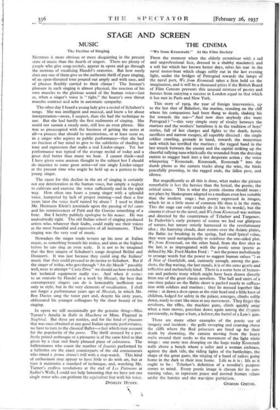MUSIC
STAGE AND SCREEN
The Decline of Singing
NOTHING is more obvious or more disquieting in the present state of music than the dearth of singers. There are plenty of people who give song-recitals, appear in opera and go through the motions of vocalising Handel's oratorios. But how rarely does any one of them give us the authentic thrill of pure singing, of an open-throated tone poured out amply and with ease, and of phrases flexibly carried to their climax ! The listener's pleasure in such singing is almost physical, the reaction of his own muscles to the glorious sound of the human voice—just as, when a singer's voice is " tight," the hearer's own throat muscles contract and ache in automatic sympathy.
The other day I heard a young lady give a recital of Schubert's songs. She was intelligent and musical, and knew a lot about interpretation—more, I suspect, than she had the technique to use. But she had hardly the first rudiments of singing. She could not sustain a steady note, still less an even phrase. She was so preoccupied with the business of getting the notes at all—a process that should be unconscious, or at least seem so, in a singer who aspires to public performance—that she had no fraction of her mind to give to the subtleties of shading in tone and expression that make a real Lieder-singer. Yet her performance was typical of the average recital of today and a great deal better than many we hear. I cannot think—and I, have given some anxious thought to the subject lest I should do injustice to some great artist—of one single Lieder-singer at the present time who might be held up as a pattern to the young singer. .
The cause for this decline in the art of singing is certainly not any deterioration in the human voice, but simply a neglect to cultivate and exercise the voice sufficiently and in the right way. How often one hears a young singer with a splendid Voice, hampered by lack of proper training—and then a few years later the voice itself ruined by abuse ! I used to think Mr. Hermann Klein's jeremiads upon the passing of bel canto and his reminiscences of Patti and the Garcias something of a bore. But I hereby publicly apologise to his manes. He was undoubtedly right. The old Italian school of singing produced artists who, whatever their faults, could really use their voices as the most beautiful and expressive of all instruments. Their singing was the very soul of music.
Nowadays the singer tends to turn up his nose at Italian music, as something beneath his notice, and aims at the highest before he can sing an even scale. It is not to be imagined that the first singers of Schubert's songs despised Bellini and Donizetti. It was just because they could sing the Italians' music that they could proceed to do justice to Schubert. But if the singer of today, who gets through "An die Musik " passably well, were to attempt "Casts Diva" we should see how wretched her technical equipment really was. And when it comes to an oratorio by Handel or a work by Mozart, the best that contemporary singers can do is lamentably inefficient not only in style, but in the very elements of vocalisation. I shall not forget a performance years ago of Messiah, in which Mr. Ben Davies sang the tenor part and, despite his sixty years, obliterated his younger colleagues by the sheer beauty of his singing.
In opera we still occasionally get the genuine thing—Miss Turner's Amelia in Ballo in Maschera or Mme. Flagstad in Siegfried. But these are rarities, and for the kind of pleasure that was once obtained at any good Italian operatic performance, we have to turn to the classical Ballet—a fact which may account for the popularity of the genre. The thrill aroused by a per- fectly poised arabesque or a pirouette is of the same kind as that given by a clear and finely phrased piece of coloratura. The balletomanes who count the number of fouettds performed by a ballerina are the exact counterparts of the old connoisseurs who timed a prima donna's trill with a stop-watch. This kind of enthusiasm may appear to have little to do with art, but at least it maintains a standard of technique, and, watching Mr. turner's endless revolutions at the end of Les Patineurs at Sadler's Wells, I could not help lamenting that we have not one single tenor who can perform the equivalent feat with his voice.
DYNELEY HUSSEY.


















































 Previous page
Previous page